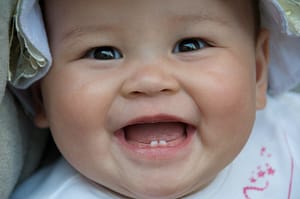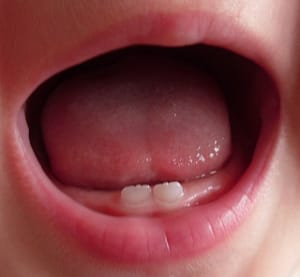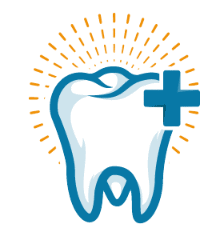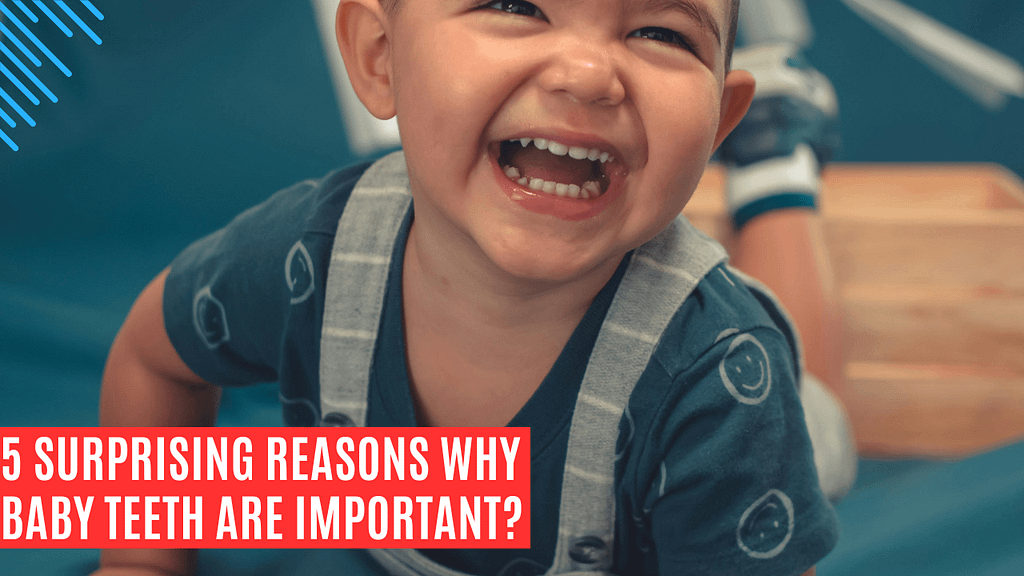People usually fail to recognize that baby teeth care significantly affects a child’s overall health. The problem arises from the belief that temporary teeth do not require maintenance like permanent ones.
To ensure that children have good oral health throughout their lives, it is essential to make them understand how regular dental hygiene practices early on in life and going for dental check-ups soon after birth can help them greatly.
By taking proper care of baby teeth, we establish a foundation for oral health that lasts a lifetime. In this blog, let’s delve into the topic and learn more about the importance of infants’ teeth.
What are Baby Teeth?
It’s a common misconception that infants don’t have teeth. In actuality, your child’s teeth begin to erupt even before birth. Around six months of age is when “milk teeth,” also known as “baby teeth,” begin to erupt.
The four upper and lower front teeth typically erupt first. For the next two to three years, a newborn’s teeth continue to erupt until there are twenty teeth.
Adult or permanent teeth will eventually erupt to replace these temporary teeth. A newborn tooth’s roots, fixed in the jaw, gradually disappear. An underlying adult tooth replaces them.

5 Interesting Reasons Why Baby Teeth Are Important?
Your child’s physical, emotional, and social development depends on having baby teeth. They play a vital role in the developmental stages of a kid’s life. Here are the most common reasons why temporary teeth are so essential:
- Eating
Due to the presence of birth teeth, infants can chew food and learn good chewing and swallowing techniques. If a youngster experiences dental pain from cavities, it may result in malnutrition because they cannot chew their food correctly.
- Speech
The development of accurate pronunciation during speech is aided by the presence and location of infant teeth. That’s especially crucial when your youngster is first learning to communicate.
- Adult Teeth Alignment
A temporary tooth usually stays in your child’s mouth until an adult tooth erupts to take its place. Beneath these teeth, permanent teeth grow and develop until they are prepared to erupt through the gums. To make room for adult teeth that are correctly aligned, the baby tooth acts as a placeholder.
When a baby’s tooth is lost, it creates a void for various reasons, such as caries, trauma, or inheritance. This can cause adult teeth to be crooked and cause other teeth to shift.
- Self Esteem
Children have a sense of self-worth and are aware of their appearance. A child’s confidence will be lowered by misaligned teeth, foul breath from oral germs, or unsightly teeth with significant cavities. This may result in him or her avoiding group situations, pictures, or smiling. An unhealthful or crooked set of teeth might ruin your child’s entire personality.
- Good Adult Teeth Result from Healthy Infant Teeth
Harmful Bacteria found in acidic meals, beverages, and snacks are the primary cause of tooth damage in infants. This injury may result in infection and discomfort.
Infant teeth with large cavities and abscesses are prone to bacterial colonization, thus resulting in tooth decay. If baby teeth are not maintained in good health, child’s permanent teeth will always be more vulnerable to cavities and other dental issues.
How to take care of baby teeth?
Before a child’s first tooth erupts, proper dental care should begin. Consider the following when a child’s first teeth erupt:
- Wipe away harmful bacteria from their gums every day with a clean, wet towel or a baby toothbrush.
- Clean your child’s teeth with a baby toothpaste.
- The best time to start flossing between your baby’s teeth is when they come into contact.
Instruct children to spit when brushing at the age of two or so. Give them water to spit into, but be careful not to give toothpaste to their mouths.
Tooth decay is the most prevalent chronic health issue in children despite significant progress in its prevention. In fact, 23 percent of children will have dental cavities before turning five. We can prevent tooth decay by adopting good oral health care.

4 Major Differences Between Adult and Temporary Milk Teeth
While the functions of baby teeth and permanent(adult) teeth are similar, you may observe some differences between your child’s teeth and your own, such as the following.
- Count: Adults have 32 permanent teeth, Whereas babies only have 20 teeth in total.
- Enamel: Compared to permanent teeth, the enamel covering milk teeth is thinner. Because the enamel is so thin on infant teeth, cavities may be more likely. Enamel helps shield the surface from decay.
- Hardness: Because primary teeth are softer than permanent teeth, they are more prone to damage from acidic meals and grinding.
- Color: Compared to permanent teeth, temporary milk teeth are inherently whiter. This common occurrence might only become apparent if your child is simultaneously growing in both baby and permanent teeth.
Bottom Line
In short, infant teeth are not just temporary fixtures; they constitute the basis for a child’s oral well-being that cements the smile of a lifetime. By fostering these primary teeth, we lay the ground for healthy grown-up boys and girls who can eat well, talk clearly, and be confident about themselves, which ensures that our children grow up healthy and happy. Let’s value and keep these diminutive teeth because they are significant in shaping an optimistic future for our kids.
FAQ’S
Why is it important to take care of temporary infant teeth?
It is essential to take care of infant teeth because they help chew, speak, and smile confidently, as well as preserve spaces for permanent teeth.
Why do humans need baby teeth?
Humans need baby teeth to learn how to chew and digest food properly and speak and pronounce words correctly.
Why do babies need teeth?
Primary teeth are essential as children advance through developmental milestones like eating solid meals and learning to pronounce words.
What are the uses of infant’s teeth?
Babies need their first teeth to chew and communicate. However, baby teeth also have another crucial function: creating space for the child’s permanent teeth in the future.

